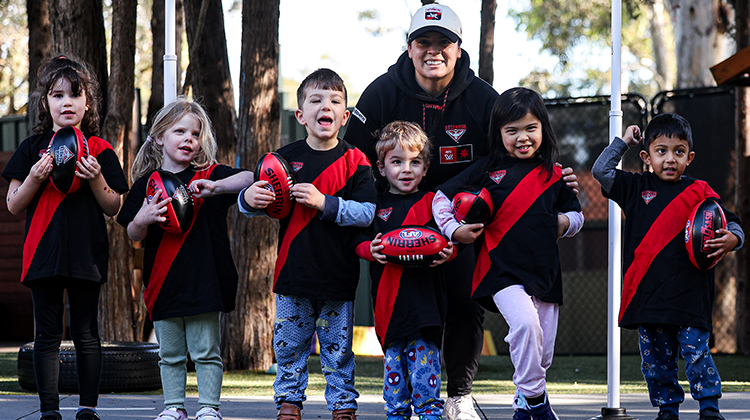Nurturing Growth Through Play: The Power of AFL in Early Childhood Education

"Kindergarten" is a German word that literally translates to "children's garden". Coined by educator Friedrich Fröbel in the early 19th century, he envisioned a nurturing environment where, like plants, children could grow and develop through creativity, play, and outdoor experiences. Fröbel saw play as the natural language of children, believing it was through play that they made sense of the world around them.
Fast forward to the 21st century and we can draw distinct parallels between Fröbel’s theories and the use of Australian rules football as a tool for play based learning in Early Childhood education in Australia.
Here are 5 ways how:
Play Based Learning and Exploration
Football themed activities naturally foster imagination and creativity, allowing children to engage in playful games that teach fundamental motor skills. In line with Fröbel’s belief, play is central to children’s development, offering them opportunities for self-discovery while building physical, cognitive, and social skills.
Children learn best when they are encouraged to explore and experiment with their environment, discovering new ideas and solutions. Football encourages children to explore different movement and speed patterns, ways to pass and share the ball and game strategies for scoring. This freedom to experiment within the sport aligns with Fröbel’s belief that self-directed exploration is essential for learning, enabling children to discover the dynamics of the game through their own curiosity.
Social Skills
Fröbel’s emphasis on social play directly aligns with how football promotes teamwork and cooperation in children, teaching them to work together and build positive relationships. He believed that social play was crucial for developing skills like communication, empathy, perseverance and collaboration. In football, teamwork is at the heart of the game, with children learning to share the ball, support each other, and understand how to work together as a team. These shared experiences help children grow socially, build stronger relationships, and learn how to be kind and considerate to others - core principles in Fröbel’s educational philosophy.
Emotional Development
Emotional development was central to Fröbel’s approach, with play serving as a means for children to express and manage their emotions. Similar to Fröbel’s methods, football provides a space where children can experience and navigate a range of emotions -such as excitement, frustration, determination, and success - within a supportive, structured environment. Through this, children build emotional resilience, gain confidence, and learn to manage their feelings, aligning with Fröbel’s belief in the power of play to foster emotional growth.
Tactile Learning
Fröbel’s used a series of educational tools, such as balls, blocks, and shapes, to help children explore key concepts like spatial relationships, movement, balance and time. These objects encouraged hands-on learning, allowing children to discover how things move, how they interact with space, and how forces like gravity affect them. Similarly, football gives children opportunities to engage in movement, speed, and teamwork, for example learning to navigate the unique challenges of an oval-shaped football. This distinctive shape requires children to think tactically, as it bounces unpredictably and moves in various directions, fostering problem-solving, coordination, and strategic thinking.
Connecting Movement to Learning
Physical activity and movement were central to Fröbel’s educational philosophy, emphasising the connection between the body’s development and learning. In football, the focus on running, jumping, kicking, handballing and other physical movements directly supports Fröbel’s belief in the body and mind being connected. By engaging in physical activity, children not only build strength and coordination but also boost their cognitive abilities, as the integration of body and mind fosters overall growth and development.
Incorporating football into early learning education blends sport with Fröbel’s core principles of play, creativity, outdoor learning, and social growth. Just as Fröbel envisioned a "children’s garden" where young minds and bodies thrive, football provides a structured yet playful environment that nurtures development. More than a game; football can be a dynamic educational tool that fosters physical, cognitive, and social growth, perfectly aligning with early childhood frameworks and pedagogy.
For more information on the club’s Early Learning Program – Bomber Kids, click here.